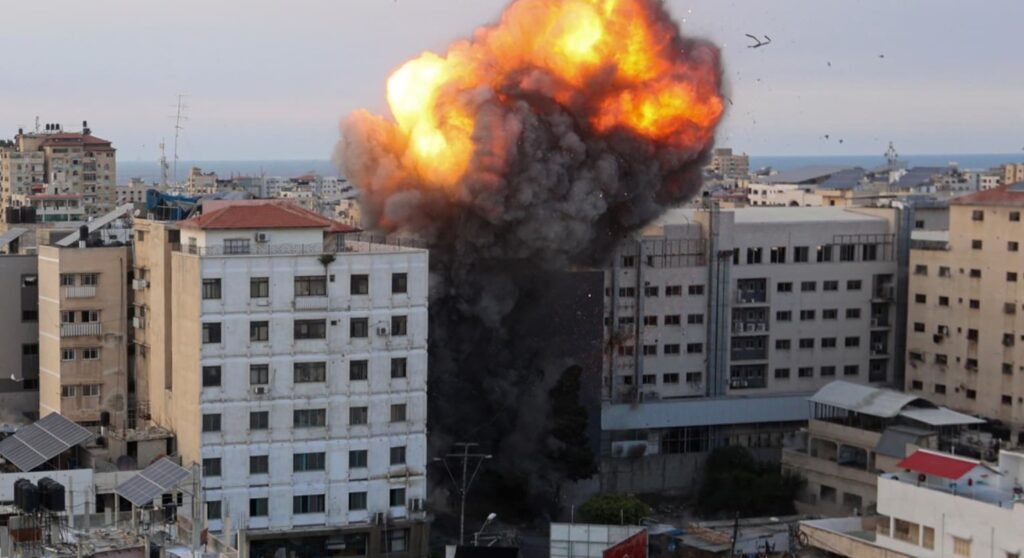Oil prices jumped 5% on Monday as Hamas launched a surprise offensive against Israel, sparking fears of a wider conflict in the Middle East, where nearly a third of the world’s oil supply comes from. The attacks, which killed more than 1,100 people in three days, were the most intense and deadly in decades, and prompted the US to send warships to the region.
What triggered the Hamas attacks?
The Hamas attacks were reportedly triggered by a series of events that escalated tensions between Israel and the Palestinians. These include:
- The planned eviction of several Palestinian families from their homes in East Jerusalem, which is claimed by both sides as their capital.
- The clashes between Israeli police and Palestinian protesters at the Al-Aqsa Mosque compound, one of the holiest sites in Islam and Judaism.
- The celebration of Jerusalem Day, which marks Israel’s capture of East Jerusalem in 1967, and is seen by Palestinians as a provocation.
- The political instability in both Israel and Palestine, where neither side has been able to form a stable government for months.
How did Israel respond to the Hamas attacks?
Israel responded to the Hamas attacks with a massive aerial and ground campaign, targeting Hamas leaders, militants, and infrastructure in Gaza. Israel also deployed its Iron Dome system, which intercepted hundreds of rockets fired by Hamas. Israel said it was acting in self-defense and aimed to restore deterrence and security.
Israel also faced internal unrest, as violent clashes erupted between Jewish and Arab citizens in several mixed cities. Israeli Prime Minister Benjamin Netanyahu condemned the violence as “anarchy” and vowed to restore order.

What is the role of Iran in the conflict?
Iran is widely believed to be behind the Hamas attacks, as it has been providing financial and military support to the militant group for years. Iran is also a sworn enemy of Israel and the US, and has been engaged in a proxy war with them in several countries in the region.
Iran may have seen an opportunity to exploit the weakness and division of its rivals, as well as to divert attention from its nuclear program, which is under intense scrutiny by the international community. Iran may also have wanted to test the response of the new US administration under President Joe Biden, who has expressed interest in reviving the 2015 nuclear deal that was abandoned by his predecessor Donald Trump.
What are the implications of the conflict for oil markets?
The conflict has raised concerns about the stability and security of oil supply from the Middle East, which accounts for about 30% of global production. Any disruption or threat to oil facilities or transportation routes could cause a spike in prices and affect the global economy.
The conflict has also increased the geopolitical risk premium, which reflects the uncertainty and volatility caused by political events. This premium adds to the cost of oil and makes it more attractive for investors and speculators.
The conflict has also highlighted the vulnerability of oil demand to shocks and disruptions, especially as the world is recovering from the Covid-19 pandemic. The pandemic has caused a historic collapse in oil consumption and prices last year, and has led to a shift in energy policies and preferences towards cleaner and renewable sources.
What are the prospects for a resolution or escalation of the conflict?
The prospects for a resolution or escalation of the conflict depend largely on the actions and intentions of the main actors involved, as well as the involvement and influence of external parties such as the US, Egypt, Qatar, Turkey, Russia, China, and others.
The US has been trying to broker a ceasefire between Israel and Hamas, but has faced resistance from both sides. The US has also faced criticism from some of its allies and adversaries for not doing enough to stop the violence or address its root causes.
The UN Security Council has also failed to agree on a joint statement or action on the conflict, due to divisions among its members. The UN Secretary-General Antonio Guterres has called for an immediate end to the “utterly appalling” violence and urged both sides to respect international humanitarian law.
The conflict could escalate further if either side escalates its attacks or expands its targets. For example, Hamas could fire more rockets or launch suicide bombings inside Israel, or Israel could launch a ground invasion or assassinate Hamas leaders. The conflict could also spread to other countries or groups in the region, such as Hezbollah in Lebanon, Syria, Iraq, Yemen, or Saudi Arabia.
